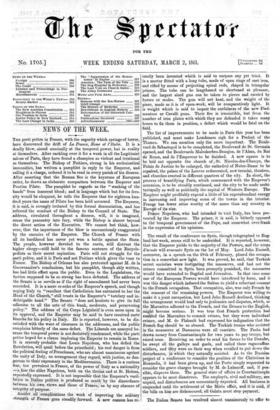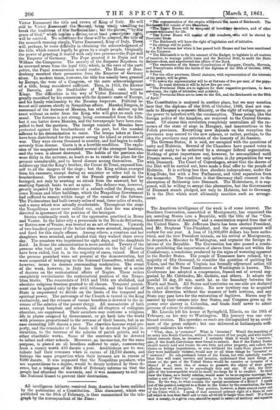The Italian Senate has resolved almost unanimously to offer to
Victor Emmanuel the title and crown of King of Italy. He will still be Victor Emmanuel the Second, being wisely iutwilling -to break the traditions of the Sardinian line ; but the phrase,'" by the grace of God," which implies a divine, or at least prescriptive right, will be omitted. No sabetituteifor theinwill;be adopted, the title at the monarch renning sim .1y, Victor Emmanuel, King of Italy. There
will, perhaps, be some culty in obtaining the acknowledgment of the title, wlich cannot legally be given by a single people. Originally the power of granting it rested with only two persons—the Pope and the Emperor of Germany. The Pope granted it to Pepin and to William the Conqueror. The anxiety of -the Emperor Napoleon to be-crowned-arose from the legal title,which, in the eyes of the parti pretre, the Papal consecration would confer. The House of Bran- denburg received -their promotion from the Emperor of Germany by Europe, the vote of a Congress, or the mere aelmowl meat alone. In modern times, however, the title -has usually been granted
-of -a title, -being considered sufficient. Thus, in 1815, the etor
of Bavaria, and the Stadtholder of Holland, each became Kings. The difficulties in the way of 'Victor _Emmanuel will be greatly smoothed by -his connexion-with the dynastic caste of Europe, and his family relationship to the Russian emperors. Political in- terest still centres chiefly in Neapolitan affairs. MarshalFergola, in command of the fortress of Messina, has refused to deliver up his trust without an order from the King, who will give no such com- mand. The fortress is not strong, being . commanded from the Ells, but it can batter down Messina, and the townspeople have been com- pelled to feed the garrison. The foreign consuls in Messina have protested against the bombardment of the port, but the marshal adheres to his determination to resist. The troops taken at Gaeta have been distributed for the present among the island as prisoners of war. They were eleven thousand in number, and had begun to suffer severely from disease. Gaeta is in a-horrible condition. The explo- sion of the magazines has crumbled several of the strongest bastions, and the town is almost destroyed. The habits of the garrison also were filthy in the extreme, so much so as to render-the place for the present unendurable, .and to breed disease among themselves. The soldiers say that the King's brother, the Count de Trani, exposed him- self to all the dangers of the siege ; but the King seldom emerged from his casemate, except during an armistice or other lull in the bombardment. The presence of the French greatly assisted the besieged, not only by averting an attack from the seaward, but by enabling Spanish boats to act as spies. The defence was, however, greatly impeded by the existence of a suburb called the Borgo, and some Roman and other buildings, which the Neapolitan Government had suffered to remain within range of the cannon of the fortress. 'The Piedmontese had built twenty miles of road, three miles of works, and a camp which was actually comfortable. Throughout the siege the Neapolitans never once sallied out, and their fire was alwa,ys directed in ignorance of the position of the besiegers. Stories continually reach us of the oppression practised in Rome and Venice. In the latter city a promenade in the Riva de Sehiavoni, or Rotten-row of Venice, was treated as an act of treason. Upwards of two hundred persons of the better class were arrested, imprisoned, and fined for this single offence. Among others, a countess and her daughters were arrested, and pleaded that they walked there every day. The countess was imprisoned for eight days, and the daughters fined. In Rome the administration is more merciful. Twenty of the persons who took part in the demonstration on the fall of Gaeta have been exiled, that is, in the majority of eases, ruined. Most of the persons punished were not present at the demonstration, but were suspected of belonging to the National Committee, which still, however, issues its decrees commanding moderation. The event cf the week, lower-ex, in Italy has been the issue of a series of decrees on the ecclesiastical affairs of Naples. These orders completely revolutionize the ecclesiastical position of the Neapo- litan States. The concordats of 1818 and 1834 are abolished, -and absolute religious freedom granted to all classes. Temporal punish- ment can be applied only by the civil tribunals, and the Council of State is empowered -to .decide on the limits of the temporal and spiritual power. The patronage of the Church is vested in the King exclusively, and the revenue of vacant benefices is devoted to the In- crease of the salaries of the poorer clergy. All monasteries of both sexes, except -hospitals and schools, and all chapters of collegiate -churches, are suppressed. Their members may continue a religious life in places .assigned by Government, or go back into 'the world with pensions proportioned to the revenue of their houses, but in no case exceeding 120 ducats a year. The churches become royal pro- perty, and the remainder of the funds will be devoted to public in- struction, to -the increase of the salaries of parish priests, and to other charitable works. Some of the convents will be devoted to infant and other schools. Moreover, an income-tax, for the same -purpose, is placed on all benefices suffered to exist, commencing from a curacy worth 450 ducats a year. Archbishops are to con- tribute half their revenues when in excess of 12,750 ducats, and bishops the same proportion when their incomes are in excess of 13500 ducats. It was supposed that the Neapolitan populace, -who are superstitious to a degree, would be deeply irritated by these de- crees, but a telegram of the 24th of February informs us that the ,,people had attacked the convents, and it was necessary to call out the National Guard to prevent their destruction.































